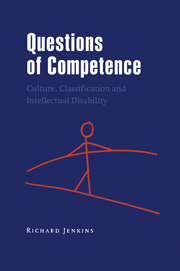Book contents
- Frontmatter
- Contents
- List of contributors
- 1 Culture, classification and (in)competence
- 2 Mental disability in the United States: an interactionist perspective
- 3 (In)competence in America in comparative perspective
- 4 Risk, resilience and competence: parents with learning difficulties and their children
- 5 Constructing other selves: (in)competences and the category of learning difficulties
- 6 Work, opportunity and culture: (in)competence in Greece and Wales
- 7 Slow cookers and madmen: competence of heart and head in rural Uganda
- 8 States and categories: indigenous models of personhood in northwest Greenland
- 9 Learning to become (in)competent: children in Belize speak out
- 10 Towards a social model of (in)competence
- Bibliography
- Index
7 - Slow cookers and madmen: competence of heart and head in rural Uganda
Published online by Cambridge University Press: 16 January 2010
- Frontmatter
- Contents
- List of contributors
- 1 Culture, classification and (in)competence
- 2 Mental disability in the United States: an interactionist perspective
- 3 (In)competence in America in comparative perspective
- 4 Risk, resilience and competence: parents with learning difficulties and their children
- 5 Constructing other selves: (in)competences and the category of learning difficulties
- 6 Work, opportunity and culture: (in)competence in Greece and Wales
- 7 Slow cookers and madmen: competence of heart and head in rural Uganda
- 8 States and categories: indigenous models of personhood in northwest Greenland
- 9 Learning to become (in)competent: children in Belize speak out
- 10 Towards a social model of (in)competence
- Bibliography
- Index
Summary
In the introduction to a classic study of mental incompetence, Walter Goldschmidt wrote:
Of all the attributes of man, mind is the quintessence; to be found wanting in mental capacity – in general intellectual competence – is the most devastating of all possible stigmata. (At least this is manifestly true for American culture; perhaps there are other cultures in which the self is less closely tied to intellective potential …
(Edgerton 1967: vii)In this paper I explore the meanings of mental competence in eastern Uganda, by considering people in whom it is found wanting. In describing individuals who are slow or foolish or mad, I shall suggest ways in which local notions of personhood, agency and self relate to competence.
Let me begin by making a distinction that is blurred in Goldschmidt's phrasing – that between intellectual and mental capacities. Intellect is generally defined as the ability to reason, perceive or understand relations or differences (the Latin root means to gather or choose among). Intelligence has to do with the ability to learn and to use reason in solving problems. In contrast, mental capacity refers to abilities of mind, a broader term that includes will, intention and feelings, as well as intellect. And mind is also a verb that means to attend to, apply oneself, care or feel concern about. This wider notion of mind and mental capacity is the more relevant for understanding the situations of ‘incompetent’ people in everyday life.
- Type
- Chapter
- Information
- Questions of CompetenceCulture, Classification and Intellectual Disability, pp. 153 - 175Publisher: Cambridge University PressPrint publication year: 1999
- 4
- Cited by



